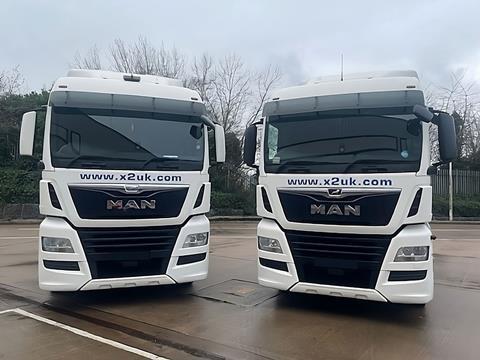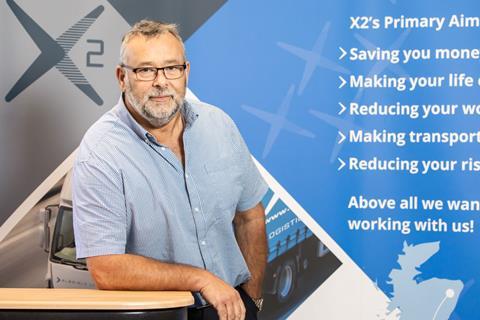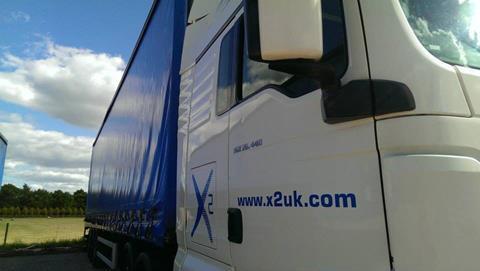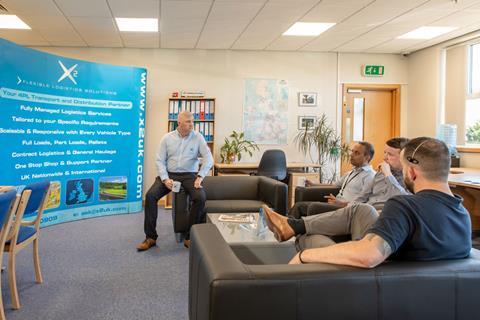
Formed in 2003 as a 4PL transport network to handle full trailer loads, X2 (UK) now employs 20 people at its Hinckley HQ and has recently become a silver sponsor of Generation Logistics, the industry-led campaign to promote career opportunities in the transport and logistics sector.
With a robust fleet of vehicles, including 12 tractors at a depot in Tamworth, X2’s main focus is linking its network of over 1,000 haulier partners with more than 260 customers. From manufacturers and retailers to warehouse operators and other logistics providers, X2’s client base is as varied as the services it provides.
“The mainstay of the business and reason for its foundation is as a 4PL,” says MD and owner Ian Cramb, pictured. For those unfamiliar with the practice, a 4PL is a fourth party logistics provider - essentially an asset-light external logistics function which companies can take advantage of to run or bolster their logistics activity – delivering strategic oversight and management of the supply chain from a “control tower” and removing limitations of a single logistics provider by tapping into an extensive 4PL nationwide network of transport and logistics partners.

An effective 4PL can offer a range of benefits to businesses across all industries, from lower overheads and reduced liability to greater flexibility and scaling potential. By outsourcing the logistics function to a group of industry experts, businesses receive access to a world-class logistics network without the significant startup or maintenance costs.
“It was formed by four Palletways members who were doing very well out of carrying one to six pallets. However, their customers told them they needed to carry on doing the full load work but that offered lower margins and vehicle utilisation than the pallet network business.
“So, they decided to replicate the pallet network model and collaborate with a large number of hauliers using a central control tower managing those assets. It was a great idea.”
The name X2 (UK) came from the service promise of moving anything from ‘X’ to anywhere and the business started with around 80 hauliers, mainly other Palletways members, on the books. Since then it has grown to cover the whole of the UK and carry just about any type of freight.
Cramb’s involvement started in 2007 when he launched a management buy-in.
“I knew one of Palletways’ owners from when we both worked at Wincanton,” he says. “X2 (UK) had parted company with its MD and after 20 years working with large 3PLs I wanted to work for myself. Thanks to my connection with the owner, I was introduced to X2 (UK) and bought in as the majority shareholder.”
Shortly after that the financial crisis struck but X2 (UK) weathered the storm and soon secured a significant new customer in the clothing retail sector.
“It was supposed to be for six months but it soon grew to four times the original volumes and went on for 15 months,” Cramb says. “That cleared most of the business’s debt and then in 2011 I took the opportunity to buy out the other three shareholders.
“Then around five years ago I felt comfortable enough to start investing in people and processes, and we have grown the business tremendously.
“We can provide any type of vehicle from a motorbike to a double deck artic, and move anything that’s not radioactive and doesn’t blow up,” says Cramb. “The network carries ambient, chilled and frozen products, construction materials and packaging that can be palletised or loose loaded.
“The haulier base includes every single vehicle type including flatbeds, truck-mounted lift trucks, tail lifts, cranes, low-loaders box vans and curtainsiders. They might work for us once a year if it is an odd load or they could work for us every day.”
This flexibility is just one reason hauliers prefer to work for a 4PL rather than work directly for a customer or subcontract with a larger 3PL.
“They can dip in and out when they want and we will go out and find work for hauliers,” explains Cramb. “A haulier can ring in and say ‘I’ve got a vehicle in Scotland, can you find me a load?’ and we can find them a return load to help their profitability.

“We pay good rates and pay faster than most companies. We are also profitable, stable and debt-free with significant reserves.”
X2 (UK) has worked with some of its hauliers since the company was created 20 years ago, and tries to form close working relationships rather than being purely transactional. Achieving the appropriate balance between customer relations whilst still offering attractive compensation to its hauliers can be a challenge, but a challenge X2 (UK) continues to excel at.
For customers X2 (UK) can provide a reliable national service for small to medium size firms who would normally fall below the radar of the major 3PLs.
“If you only want to spend £10,000 a year with us, provided you are creditworthy, we will work with you,” says Cramb. “Our biggest customer is probably spending less than £2m. We describe our service as a ‘dimmer switch’ because we can turn it off, full on or anywhere in between.
“For one parcel carrier, in their busiest six weeks, we put in 150 tractor units with drivers seven days a week, across two depots. A big drinks manufacturer was also failing loads to supermarkets with its haulier base and we started with them the day after I gave them the quote. We did 98 full loads we were offered in the first week, with no lates and no failures..
“Our haulier base is big and spans owner drivers to 25-truck companies. We are a single point of contact without a single point of failure. They get the benefit of only having one person to ring to cover their 30 or 40 loads a days rather than getting their own people – who they are probably short of – to handle the negotiations. I call our people logistics brokers because they will find the best haulier at the right rate.
“The customer pays us and we pay the hauliers so they only get one invoice from us. One customer was using 52 separate hauliers until they came to us.”
Driver shortages and rising costs have put huge pressure on hauliers of this size in the last couple of years and Cramb admits it is becoming a “tough market”.
“We work very hard to keep those people in work,” he says. “The whole market is difficult, not just for the small guys, and I think there will be more failures. A lot of the people we work with are pretty savvy and buy secondhand trucks, which are still good trucks, rather than spend £100,000-plus on a new vehicle.
“But customers have to realise they need to spend more money if they want to get their stuff shifted. We’ve worked with retailers and seen their transport spends – we know if they spent 20% more it wouldn’t really affect their overall costs, but if he can’t get his products on the shelves they stand to lose that 100% gross retail margin.”
The charging and payment structure very much depends on the type of work being covered by X2 (UK) and its hauliers.
“For a manufacturer delivering to retailer DCs for example we charge a static lane rate,” says Cramb. “Some contracts can also include fuel surcharges, delays and demurrage. We also do traction-only on a day rate while other jobs are negotiated on the day as they come in.”
Fuel surcharges are a big issue on high mileage traction-only jobs in particular where diesel can represent 50% of the total costs.

“For local movements, fuel can be 10% or 15% of costs but it is significantly higher on high mileage routes,” says Cramb. “In some cases, we negotiate with transactional customers on the rate each day to reflect what we need to pay the haulier, but for contracted customers we have a fuel price mechanism in place and set rates.”
Another significant benefit to customers when using X2 (UK) as opposed to a freight exchange is that their job is proactively managed.
“We don’t just say ‘here’s the website, collect the load and we will track it’, says Cramb. “It doesn’t work. My team know that if I ask ‘how are we getting on with a new customer’ they can’t say ‘I’ve heard nothing’. The truck could be in a ditch or the driver slept in. I need positive confirmation that we are doing every job on time otherwise the reputation of X2 (UK) and our customer can suffer”
X2 (UK) has used the Mandata transport management system from the start. Cramb is a big fan of CRM software HubSpot which has digitised much of the job progress monitoring.
“Where we used to have the good old whiteboard with all the loads and hauliers, it is all on HubSpot now,” he says. “We capture every offer, every rejection and every load and everyone can see it on their screens.
“We are now getting Mandata to accept a feed directly from HubSpot.”
While it is still early days X2 (UK) is starting to use artificial intelligence (AI) for PR and marketing purposes and Cramb sees “applications for AI in many other areas of our business” in the future.
X2 (UK) currently operates mainly in the UK road freight transport market, though it still “dabbles” in continental European movements.
“We used to do more European work before Brexit but it became too complicated and too expensive,” says Cramb. “We carry a small volume of European work for our customers today. We have just recruited a sales & marketing director with European experience so we may have another look at it.
“But there are still huge market opportunities for our services in the UK without diversification.”
Driver shortage not gone away
While the higher pay offered to drivers in 2023 alleviated the driver shortage as people with valid HGV licences were tempted back into the industry, Cramb believes the underlying problem has not gone away and will re-emerge once the economy picks up. In fact, the next shortage may be even closer than anticipated, with recent ONS data showing the previous crisis was caused by a reduction in drivers of just 15%, rather than the originally thought 23%.
“There is still a driver shortage,” he says. “But there is also a demand shortage at this time and as volumes start to creep back the driver shortage will again become a major problem.
“That is why we joined Generation Logistics – we need to attract more people into the industry by treating them properly and paying them appropriately.”

The economic slowdown is affecting some sectors worse than others, with construction as ever the first to be affected.
“As soon as interest rates went up, house building cooled and we now have a supplier offering us 10 vehicles a day out of his fleet,” says Cramb. “These vehicles include tipper trucks, flatbeds and crane-equipped vehicles. There is talk of 10% less product being moved around compared to pre-pandemic levels.”
Also, the absence of traditional Christmas and summer peaks over the last couple of years has caused challenges with forecasting and subsequent resourcing for businesses across a range of industries, namely retail and manufacturing. This is where partnering with a 4PL is beneficial to avoid sunk costs with lengthy lease agreements or under-utilised fleets.
No matter the looming challenges on the horizon, X2 (UK) remains well positioned to continue delivering excellent logistics support to its clientele, whilst reinforcing the wider logistics industry with proactive career initiatives.
The future of the logistics industry is a changeable one, but it’s all the brighter with companies like X2 (UK) pushing sustainable, efficient logistics practice to the forefront.














